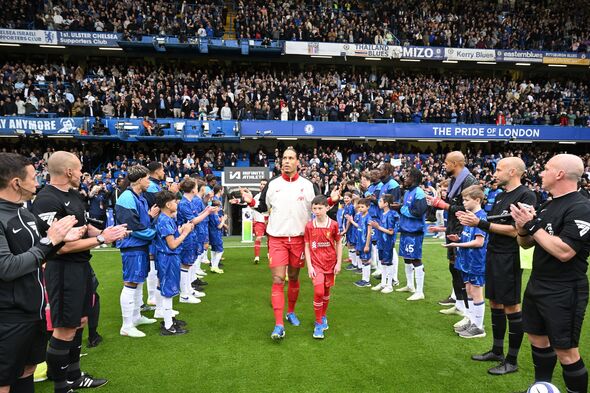
Why Arsenal Are Free to Refuse a Guard of Honour for Liverpool After Losing the Title Race.
In the world of football, tradition and respect often blend with fierce competition and emotional stakes. One such tradition is the “guard of honour”—a ceremonial gesture where players of one team line up to applaud the newly crowned champions as they enter the pitch. This act is typically seen as a sign of respect and sportsmanship. However, it is not a rule enshrined in official football regulations, and teams are not obligated to perform it. With Liverpool potentially securing the Premier League title, questions have arisen about whether Arsenal would offer a guard of honour—especially given the emotional context of a tightly contested title race. Here’s why Arsenal are within their rights to decline.
1. No Formal Requirement
The Premier League does not mandate a guard of honour. There are no official rules or statutes compelling clubs to provide this gesture. It remains entirely at the discretion of each club. This means Arsenal, or any club for that matter, can choose whether or not to carry out the tradition based on their own judgment and internal discussions.
2. Guard of Honour Is a Tradition, Not a Rule
The guard of honour is a tradition rooted in respect and acknowledgement of excellence. Over the years, clubs have used it to celebrate worthy champions, especially when there is no animosity or bitter rivalry. While it can symbolize good sportsmanship, it is by no means a requirement. Many managers and players see it as a noble gesture, but only when it’s offered willingly, not under pressure.
3. The Emotional Context of a Title Race
The 2024–25 Premier League season has seen a tense and highly competitive title race between Arsenal, Liverpool, and possibly other contenders. If Arsenal narrowly lose the title to Liverpool, emotions in the dressing room and among fans will be raw. Expecting Arsenal players to line up and applaud a direct rival who just denied them a major trophy may be asking too much. In such circumstances, the gesture could feel forced or hollow, diminishing its intended spirit.
4. Precedents of Refusals
There are several instances in Premier League history where clubs have either declined to offer a guard of honour or have done so in a minimalist or reluctant fashion. One notable example was in 2018 when Chelsea did not offer one to Manchester City. Similarly, in 2020, when Liverpool had just won the title, Manchester City did offer a guard of honour—but the mood was subdued, and debates around its necessity emerged.
Arsenal themselves have received and given guards of honour in the past, such as after their famous unbeaten 2003–04 season. But each situation is unique, and there’s no obligation to repeat history, especially in a highly competitive and emotionally charged environment.
5. Fan and Media Reactions Matter
In today’s hyper-analyzed football landscape, every gesture is scrutinized. A guard of honour from Arsenal for Liverpool would undoubtedly make headlines, and depending on the spirit in which it’s perceived, it could lead to unnecessary backlash. Arsenal fans, in particular, might see the act as capitulation or humiliation, especially if Liverpool clinch the title at the Emirates or soon before a fixture between the two clubs. Given this sensitivity, Arsenal’s management may prioritize morale and optics over tradition.
6. Managerial and Player Autonomy
Ultimately, the decision to offer a guard of honour would come down to Mikel Arteta and the Arsenal leadership. If they feel it’s in the best interest of the club and maintains dignity while honoring tradition, they might proceed with it. However, if the atmosphere is deemed too tense or the gesture could hurt the players’ mindset, especially heading into other competitions like the FA Cup or European tournaments, they might opt against it.
Arteta, having worked under Pep Guardiola, is no stranger to the symbolic weight of such gestures. However, he has also emphasized competitiveness, focus, and mentality. If he believes that clapping for Liverpool could damage Arsenal’s mental edge, particularly among younger players, he may rightfully decline the honour.
7. Liverpool’s Stance on It
It’s worth noting that Liverpool are not demanding or expecting a guard of honour. Jürgen Klopp and his team have historically played down such traditions, preferring to focus on performance and results. If Liverpool win the title, they may feel satisfied enough with their achievement without needing public validation from a rival team.
8. Timing and Context Matter
If Liverpool win the title on the final day of the season or just before facing Arsenal, it’s important to consider the timeline. Arsenal may have little time to process their own heartbreak and react accordingly. Asking them to immediately turn around and celebrate another team may feel insensitive or untimely, even if it’s technically a sportsmanlike gesture.
Conclusion
While a guard of honour is a respected tradition in football, it is not a mandated requirement, especially in the Premier League. Arsenal are entirely within their rights to refuse offering one to Liverpool should the Merseyside club clinch the title. Given the emotional intensity of the title race, the need to protect team morale, and the lack of any formal obligation, Arsenal’s potential decision to withhold a guard of honour would be understandable. Ultimately, sportsmanship is about genuine respect—not forced rituals. Whether or not Arsenal opt to applaud Liverpool, both teams’ achievements this season will stand on their own merit.
Would you like a shorter version for social media or a headline summary as well?







